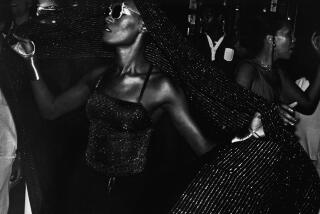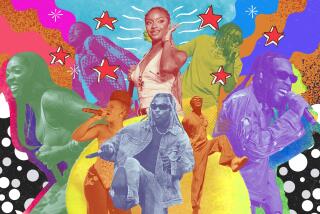Adding hues to rural music
The banjo claws, the fiddle saws, the twangy, ancient-sounding voice sings of darkness and murder.
The recording of the folk staple “Little Sadie” -- like most of the tracks on the 2007 album “Dona Got a Ramblin’ Mind” -- is pure mountain music, the kind indelibly associated with the rural white communities of the 19th and early 20th century American South.
But the Carolina Chocolate Drops, who made “Dona,” are three young African Americans, and for many their music will be an eye-opening introduction to the tradition of the black string bands that provided a soundtrack for the South alongside their white counterparts.
The Drops’ square-dance drive and infectious performances have made them a hot act on the folk circuit. After playing L.A.’s Mint club last fall, they’re back for a McCabe’s date Friday and a spot with New Orleans storyteller John O’Neal in a children’s program at Disney Hall on Saturday.
“We were just normal regular Joes a little while ago, and now we’ve gotten all sorts of stuff. It’s just been different,” says Dom Flemons, 25, who formed the North Carolina-based group with Rhiannon Giddens, 30, and Justin Robinson, 25, three years ago. The music is bedrock basic, shaped by their tutelage by one of the music’s elders. The string-band instrumentation is enhanced by a bit of jug-blowing and snare-tapping, suggesting the interaction that occurred even in the Jim Crow era.
“Music will cross racial boundaries with no problem whatsoever,” says Flemons. “Whether it’s kids offending their parents or ... people that just want to hear something different and they’re willing to take that chance to walk across racial lines, you see that with music all the time.”
In reanimating this abandoned tradition, the three musicians have inevitably stirred racial overtones. But despite the playfully provocative group name and the presence of the often divisive “Dixie” in their song list, Flemons says there’s been no negative feedback, and no message intended.
“We’re just trying to play the music and be like, ‘This is part of our whole American history.’ Just showing people the musical traditions that America has. Through all of its hardships, it has very powerful music it makes. Whether it’s out of the struggle or whether it’s just social music or the mixing of different cultures coming together, it’s amazing.
“I’ve noticed over the years people being very discontent with America in general, and I think if we can take pride in the things that we make, the art that Americans make, then we can actually look around and make things better.”
--


